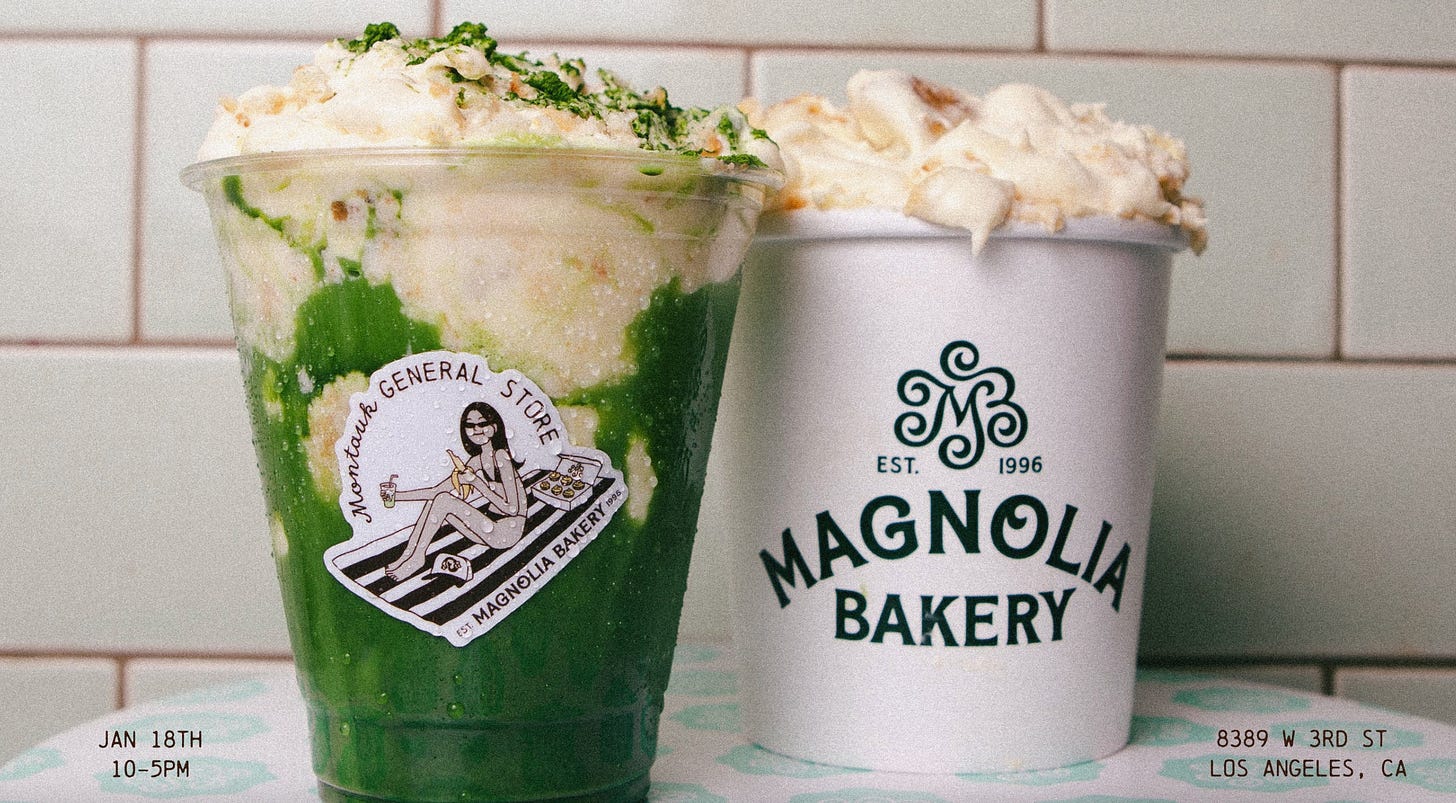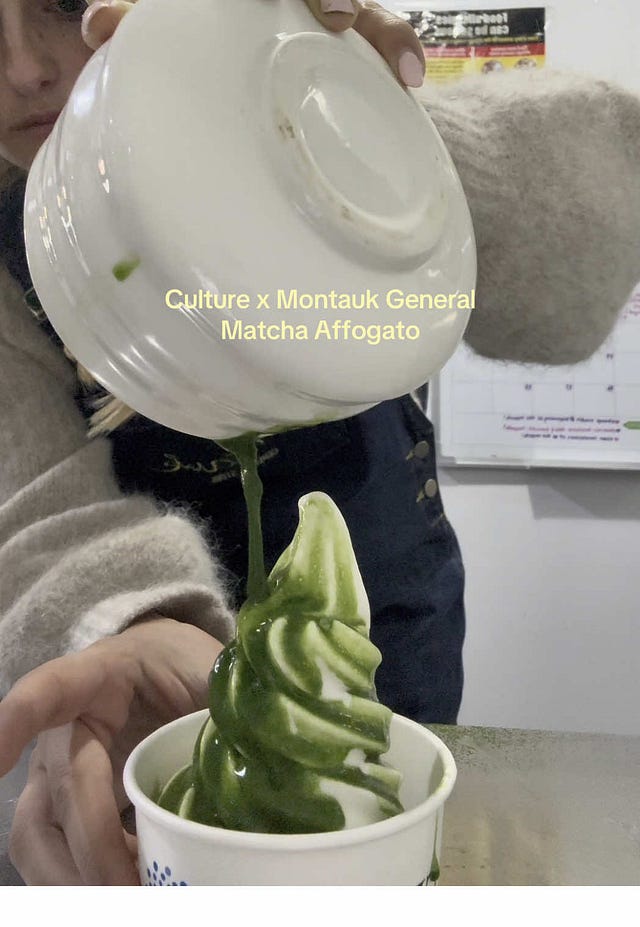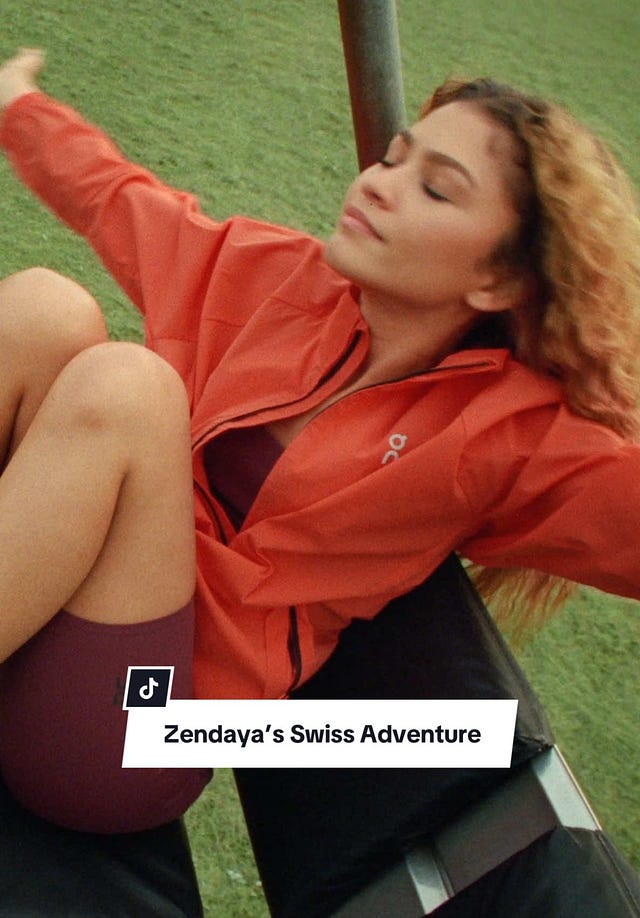no. 34: can collaboration ideas be a business?
opentable vs. resy, deals, and banana pudding matcha
hi all! hope your monday is off to a good start. this week i am back but keeping it brief, as i have been inundated with news.
mini news round-up 🗞️
pepsico is said near $1.5 billion-plus deal for soda brand poppi - this has made news very quickly, and i have been sent this article four separate times. this does not surprise me but is insane to see happen, especially with the launch of coca cola’s competitor prebiotic soda “simply pop”.
are the cool restaurants are on opentable now? - estela, raf's, and win son are just some of the restaurants that have moved from resy to opentable. according to reddit, opentable is paying them upwards of 50k at the minimum to switch. i’ve been noticing over the last few months here in nyc but if that is true…yikes.
pickle announces $12M series a funding to revolutionize fashion rental - “a fundamental shift in commerce is indeed happening, and your favorite peer-to-peer rental platform, pickle, is right at the forefront." we’re creating a circular economy that makes once-aspirational and exclusive fashion accessible to everyone, and we believe that together, we can redefine how the world thinks about fashion…” from their series a announcement. i think pickle only works successfully within nyc due to the target demo and the scale of the city but maybe i will be proved wrong here as they expand.
can america’s tech mindset build a luxury conglomerate? - american firms often “prioritize scalable technology and intellectual property over the craftsmanship, history, and creativity that define luxury brands.” jean-marc bellaiche, ceo of printemps, notes that american investors' focus on short-term gains contrasts with european luxury groups' long-term development strategies. do we lack the confidence and commitment to nurture luxury brands through their ups and downs? this was a fascinating piece and worth a fun read.
the future of the internet is likely smaller communities, with a focus on curated experiences - “legacy technology (e.g., google) and social platforms are rapidly losing ground as trust and authenticity fade, with more people flocking to ai chatbots, niche communities, and platforms like tiktok. this signals a massive shift and opens the door for disruptive entrants that will offer more authentic, trusted experiences.” forty-two percent of consumers find that search engines like google are becoming less useful.
forever 21 is closing all of its stores after filing for bankruptcy - this is certainly an end of an era and forever21 will forever be missed.
i’m seeing more and more startups emerge for brands to track their performance in ai agents - i highlighted profound a few weeks ago and i now have seen a second startup, evertune. evertune helps brands understand what ai tells consumers about their brand with cutting-edge brand analytics built for the ai age. i don’t see anyone talking about it yet… i think i am onto something.
brand-storming 🧃
icymi: this is a new section quickly highlighting the brands i’m liking, watching, and buying across cpg/ tech.
trends to watch 👀
can collaboration ideas be a business… in itself? the answer is yes — and that it’s already happening.
there is a tiktok account called montauk general store that’s serving up matcha with magnolia bakery banana pudding, cinnamon rolls on top of matcha, and popping up with trendy stores and restaurants. at the core of this experiment, there is a very basic idea that requires:
delivering a visually compelling product through social media
collaborating with other brands to create limited-edition experiences
 Tiktok failed to load.
Tiktok failed to load.Enable 3rd party cookies or use another browser
let’s call this a "collab-first brand" business model, where:
instead of making your own product, you exist only through collaborations.
you provide the branding, marketing, and viral strategy, while your partners provide part of the product.
example: montauk general’s matcha with magnolia bakery banana pudding on top, served only for a weekend, with social media press and posts on tiktok and instagram.
a decade ago, this approach would have been next to impossible. but now, collab-first brands could exist and potentially sustain in the near-term.
1. tiktok has simply redefined what distribution means
in the past, a brand needed physical retail, a dtc site, or deep industry connections to get a product in front of consumers. today, tiktok can make an unknown concept go viral overnight, driving demand and foot traffic with a single post. collab-first brands will leverage tiktok as their primary distribution channel, relying on aesthetic and visual storytelling instead of traditional pathways. we already knew this, though.
2. the genesis of “brand as a media company”
modern brands are long past the point of just selling products. this is why companies like glossier, erewhon, and the like, now have to operate more like media entities. a collab-first brand will operate in a similar capacity.
for the same reason, brands like on cloud are doing a phenomenal job acting as a media entity via their advertising right now. if you see how they show up across all their socials and their physical storefront, they are in the game of storytelling and content rather than pushing products. and it’s working.
while inherently simplistic at the crux, “companies” or marketing experiments, can quite literally operate as curators and experience designers rather than traditional product companies these days. (brands reading this, take notes)
as always, let me know what you think. do you think this is a sustainable business model? can collab-first brands exist?
thanks for being here. see you all next week!











Highly recommend the Acquired episode about Hermes if you’re interested in luxury brands and haven’t heard it! Really cool to hear their history and how incredibly intense the craft is
https://open.spotify.com/episode/3JnXyI5G7umpVWijAvoL36?si=1RFpr0VDTMCep5DhWN13bw
Love the idea of collab first - it’s how we originally grew stationery brand Papier - leveraging new audiences, aesthetics etc - but I think for longevity collaborations work best within a bigger ecosystem and more robust storytelling. Two brands coming together that both have an aesthetic and audiences makes it a much stronger and cooler.
Plus from a commercial perspective it makes sense to do a bit of both!